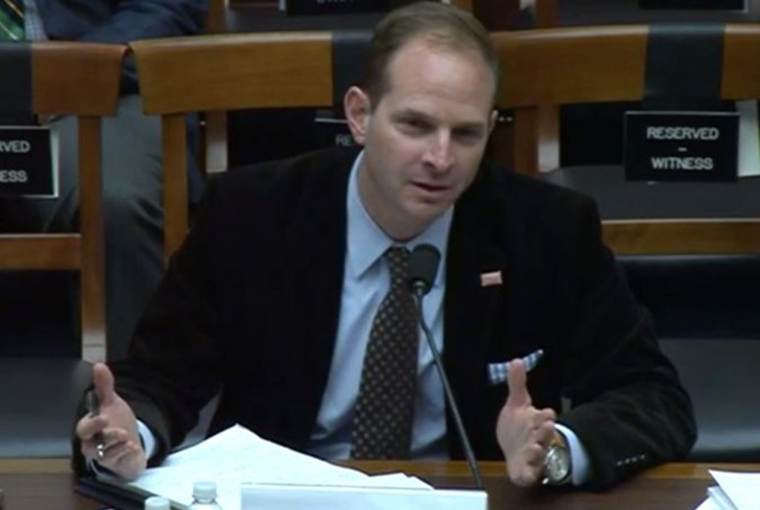Naval War College professor testifies on risks, rewards of security cooperation

WASHINGTON – A professor from U.S. Naval War College (NWC) in Newport, Rhode Island testified before a congressional committee on international security cooperation Wednesday, highlighting the positive and negative outcomes of military cooperation with other nations.
Derek S. Reveron, professor of national security affairs and the EMC informationist chair at the college, described to the House Armed Service Committee the importance of international partnerships and strengthening security ties with others.
One of the biggest benefits to cooperating with partners is the augmented ability to work with other countries, according to Reveron.
“Since coalition operations are a norm, security cooperation ensures partners are interoperable with U.S. forces,” said Reveron. “For example, in Afghanistan, we operated with 50 partners who brought capabilities we could not, such as police training. In Bahrain, a U.S. officer directs three naval task forces composed of 30 partners who collectively protect vital trade routes. And in Key West, Joint Interagency Task Force South serves as a fusion center supporting international efforts to eliminate illicit trafficking in the Caribbean and Latin America.”
Reveron added that security cooperation enables the coalitions to better perform their functions and ensure that partners have access to the U.S. defense industrial base. Additionally, U.S.-sponsored military exercises promote interoperability.
However, there are challenges to these types of agreements, noted Reveron.
“Given the disappointments in Syria, Iraq and Afghanistan, there is a potential for the value of security cooperation to be ignored, but these programs are not confined to combat zones alone. When thinking about security cooperation, we should look at how international partners contribute to coalition operations, peacekeeping and global security,” Reveron concluded.
One of the main problems is that the nature of these agreements can lead to frustration. These activities often produce more failures than successes, which negatively impacts confidence in security cooperation as a tool, said Reveron.
Another challenge in these types of operations is the United States getting involved and being viewed as an outsider by the host country.
“Without indigenous political legitimacy, programs can only have marginal impact on a country’s security and stability,” Reveron said.
These programs must be careful to avoid a sense of giving other countries a budgetary ‘free ride’ for their own defense responsibilities, he added.
Reveron concluded that as the U.S. military faces budget declines, the importance of security cooperation will be an increasingly important part of U.S. defense strategy. The full hearing can be viewed at http://youtu.be/2pMLnMgaYhY .
Derek S. Reveron, professor of national security affairs and the EMC informationist chair at the college, described to the House Armed Service Committee the importance of international partnerships and strengthening security ties with others.
One of the biggest benefits to cooperating with partners is the augmented ability to work with other countries, according to Reveron.
“Since coalition operations are a norm, security cooperation ensures partners are interoperable with U.S. forces,” said Reveron. “For example, in Afghanistan, we operated with 50 partners who brought capabilities we could not, such as police training. In Bahrain, a U.S. officer directs three naval task forces composed of 30 partners who collectively protect vital trade routes. And in Key West, Joint Interagency Task Force South serves as a fusion center supporting international efforts to eliminate illicit trafficking in the Caribbean and Latin America.”
Reveron added that security cooperation enables the coalitions to better perform their functions and ensure that partners have access to the U.S. defense industrial base. Additionally, U.S.-sponsored military exercises promote interoperability.
However, there are challenges to these types of agreements, noted Reveron.
“Given the disappointments in Syria, Iraq and Afghanistan, there is a potential for the value of security cooperation to be ignored, but these programs are not confined to combat zones alone. When thinking about security cooperation, we should look at how international partners contribute to coalition operations, peacekeeping and global security,” Reveron concluded.
One of the main problems is that the nature of these agreements can lead to frustration. These activities often produce more failures than successes, which negatively impacts confidence in security cooperation as a tool, said Reveron.
Another challenge in these types of operations is the United States getting involved and being viewed as an outsider by the host country.
“Without indigenous political legitimacy, programs can only have marginal impact on a country’s security and stability,” Reveron said.
These programs must be careful to avoid a sense of giving other countries a budgetary ‘free ride’ for their own defense responsibilities, he added.
Reveron concluded that as the U.S. military faces budget declines, the importance of security cooperation will be an increasingly important part of U.S. defense strategy. The full hearing can be viewed at http://youtu.be/2pMLnMgaYhY .
About this News Article
Article Information
October 21, 2015
Most Recent
News, Media, & Events
U.S. Naval War College's 2023 Newport Arctic Scholars Study Integrated Naval Deterrence in the Arctic Region
Feb. 10, 2023
News Publication
NWC Alumni Serve as Delegates to International Seapower Symposium 25
Sep. 25, 2023
News Publication
Lectures of Opportunity: "The Role of Operational Energy in National Security"
Feb. 24, 2025
12:00 PM
U.S. Naval War College, 686 Cushing Rd, Newport, RI 02841
Chairman of the Joint Chiefs of Staff Delivers Lecture at U.S. Naval War College
Nov. 21, 2024
News Publication
